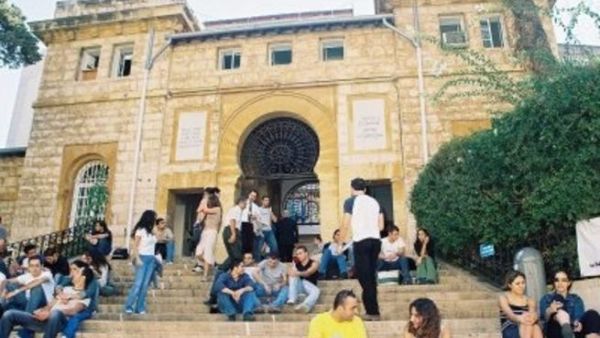Mixed emotions dominated on the first day of a new semester at the American University of Beirut. Seniors worried about job prospects and freshmen are looking for classes as the potential for a fresh batch of strikes related to the unresolved issue of tuition fees looms.
Last year’s strikes over a proposed 6 percent hike in tuition fees dominated headlines as thousands of students occupied the campus in protests. It seems as though this year may be similar.
When third-year landscaping architecture student Nour Hamouie was asked what she was looking forward to most this year, she replied, “Strikes!” emphatically.
“We need to see what they [administration] say first,” she added cautiously. “If they’re going to stick to having an increase then there’ll be a problem. But if they’re willing to pull back a little bit then we’ll probably talk about other ways to solve things.”
The strikes resulted in a drop from a 6 percent hike to 3 percent for existing students and 5 percent for new students, but many were not happy with this outcome.
“Yes we were helping with the strike a little bit. But no result,” Clara Mawaad, a second year business student, told The Daily Star. “Same strike every year but no result.”
Many students share this sentiment as there is a feeling that the eventual reduction in the hike did not go far enough.
The protests in April this year involved taking over the College Hall, which contains the AUB President Peter Dorman, Provost Ahmad Dallal and the university’s Chief Financial Officer George DeBin’s offices, by setting up tents.
The protest was named Occupy College Hall, inspired by Occupy Wall Street.
The sit-in led to negotiations between the faculty and the student union that led to the eventual decrease in the hike.
New students who have heard of last year’s strikes are bracing themselves for more in their first year of university. Serge Mousa, a business student, said that he would be happy to get involved.
“We have to be the majority, we really want to make a stand,” Mousa added.
Some other freshmen were more apathetic to the cause. Amir Jabak, a biology student who grew up in Boston, was not as concerned about the strikes.
“I heard about [the strikes]. I don’t really care. As long as it doesn’t affect me and stuff, I’m good,” he said with a shrug.
AUB’s student body also consists of a large international community that is largely detached from the strikes. “After a few years, you’re going to get used to strikes,” said Uliana Philippouskaya, a sociology and psychology senior from Russia.
“As a Russian, I prefer to steer clear of the situation. I don’t wanna get kidnapped or something,” she added with a smile.
Joachim Satorph-Poulsen and Michael Hjoellund, two Danish students studying Media and Journalism at AUB for one semester, were completely unaware of the strikes but were having some issues adjusting to other aspects of Lebanese student life.
“You don’t have a university like this in Copenhagen,” Poulsen told The Daily Star. “I think you can drink a beer at any Danish university. Smoke where you want to. Sometimes our teachers are even bartenders!”
Hjoellund, however, was more concerned about the Electricite du Liban contract workers strikes than that of the students.
“We’ve had a lot of unexpected electricity cuts. I’ve been here for one week and I’ve been experiencing a lot of electricity cuts, more than I was supposed to,” Hjoellund said.
Nonetheless, both were excited about the prospect of a future in Lebanon. “If we wanted a straightforward Danish experience then we would’ve stayed in Denmark,” Poulsen added.
Many students are beginning their last year of studies and were starting to ponder future job prospects.
The current outlook in Lebanon, on a security and economic level, has left many students uncertain about the future. New graduates in engineering, architecture and computer science don’t see staying in Lebanon as a viable option after graduation.
“There [are job prospects in Lebanon] but they won’t pay you. I won’t stay for $700/month,” Saleem al-Duree, a computer science student in his final year, bemoaned.
While the average salary for a new graduate programmer in Lebanon is $800/month on average, a programmer in Dubai will likely make double that. According to Paysacle.com, new graduate programmers in Dubai make on average $20,000/year and often have their living and travel expenses covered.
The lack of businesses headquartered in Lebanon is also causing brain drain as Maya Melhem and Serene Moneim, both landscaping architecture students, complained that there are no businesses in Lebanon that specialize in their field.
“For example, we did our internships and most of the projects we worked on were in the Mideast but not in Lebanon,” Moneim explained.
Most of their work was in Kuwait, Dubai, Abu Dhabi, Qatar and even in Iraq’s Irbil.
“We have to leave, but we’d rather work here if there were opportunities,” Melhem added.
It’s common trend that as the Gulf countries continue to grow, they attract more of the region’s young talent. Prior to the establishment of the ISIS caliphate, Iraq was also experiencing strong growth fueled by further exploitation of its vast oil reserves, leaving Lebanon with an ongoing brain drain.
However, not all students are attracted by lucrative career opportunities abroad. A third year computer science student who did not wish to be named said that she’s excited to be graduating but she has no intentions of leaving Lebanon.
“I might go and work with my father [after I graduate] but I don’t want to leave. I love my country.”









